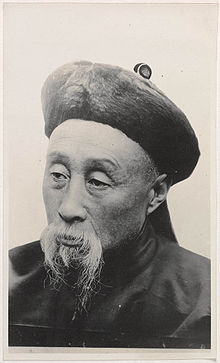Zhao Erfeng 趙爾豐 | |
|---|---|
 Zhao Erfeng | |
| Viceroy of Sichuan | |
| In office 21 April – 6 November 1911 (acting) | |
| Monarch | Xuantong Emperor |
| Preceded by | Zhao Erxun |
| Succeeded by | Position abolished |
| Assistant Amban of Tibet at Chamdo | |
| In office 1908–1911 | |
| Monarch | Xuantong Emperor |
| Preceded by | Feng Quan |
| Succeeded by | Position abolished |
| Personal details | |
| Born | 1845 |
| Died | 22 December 1911 (aged 65–66) Sichuan |
| Cause of death | Decapitation |
| Nationality | Han chinese Bannerman |
| Relations | Zhao Erxun (brother) |
| Education | juren degree in the imperial examination[1] |
| Nickname(s) | Butcher of Kham, Zhao the Butcher |
| Military service | |
| Allegiance | |
| Unit | Eight Banners |
| Battles/wars | 1905 Tibetan Rebellion, Chinese expedition to Tibet (1910), 1911 Tibetan Rebellion, Xinhai Revolution |
| Zhao Erfeng | |||||||||
|---|---|---|---|---|---|---|---|---|---|
| Traditional Chinese | 趙爾豊 | ||||||||
| Simplified Chinese | 赵尔丰 | ||||||||
| |||||||||
| Jihe (courtesy name) | |||||||||
| Chinese | 季和 | ||||||||
| |||||||||
Zhao Erfeng (1845–1911), courtesy name Jihe, was a late Qing Dynasty official and Han Chinese bannerman who belonged to the Plain Blue Banner. He was an assistant amban in Tibet at Chamdo in Kham (eastern Tibet). He was appointed in March 1908 under Lien Yu, the main amban in Lhasa. Formerly Director-General of the Sichuan-Hubei Railway and acting viceroy of Sichuan province, Zhao was a much-maligned Chinese general of the late imperial era who led military campaigns throughout Kham, earning himself the nickname "the Butcher of Kham"[2] and "Zhao the Butcher"[3] (Chinese: 赵屠户).[4]
- ^ a b "趙爾豐".
- ^ Tsering Shakya, "The Thirteenth Dalai Lama, Tubten Gyatso" Treasury of Lives, accessed May 11, 2021
- ^ Arpi, Claude. The Fate of Tibet. Har-Anand Publications.
- ^ 赵尔丰及其巴塘经营 (Zhao Erfeng and his Batang management), cnki.com.cn. (Author not specified): 'When Zhao Erfeng took office at the Yongning Daotai in the Xuyong Hall of Sichuan, he had murdered more than 3,000 innocent people in Gulin County, and from then on he became famous as "Zhao Tuhu".' (machine translation)